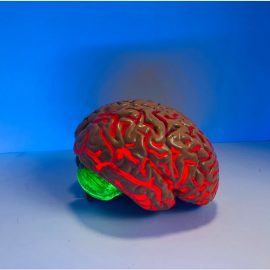

This article is an excerpt from the Shortform book guide to "The Untethered Soul" by Michael A. Singer. Shortform has the world's best summaries and analyses of books you should be reading.
Like this article? Sign up for a free trial here .
What does it mean to attain spiritual freedom? And why do you think people seek its attainment in the first place?
When psychic gurus talk about attaining spiritual freedom, they are referring to releasing your psyche from being trapped by your ego. Most people live their lives trying to stay in the prison of their self-concept. But this is miserable and exhausting because the psyche is complex and ever-changing, and it requires a tremendous amount of energy to bend it to one’s will.
Here’s a useful metaphor to help you understand how to attain spiritual freedom.
What Does It Mean to Attain Spiritual Freedom?
To attain spiritual freedom means to go beyond the disturbances in your psyche, to break the magic spell that your mental world has always wielded over your consciousness.
Here’s an allegory to understand this idea:
Imagine finding yourself in a beautiful, open, sunny field. You decide to buy it and build your dream house. You build the house of permanent materials and seal its perimeter for energy efficiency. You install a great security system. After you move in, you love your house so much that you start spending all your time inside. You lock the doors and windows, like a fortress, and luxuriate in your self-made environment.
Eventually the lights start to burn out, but you’ve become so accustomed to living inside that you don’t open the window shades because you don’t even want to see the outside anymore. In fact, you can hardly remember the outside world. When the bulbs finally burn out, you use candles. Stress and darkness take a toll on you. Groping around in the dark, you feel constant anxiety.
One day you come across a book in your library that talks about a natural, radiant light “outside,” a light that shines perpetually under its own power. The book even talks about “going outside” to see and bathe in this light. This is totally beyond your comprehension. You’ve lived in your house for so long that it has become your entire frame of reference. But the book touches something deep within you, filling you with terror and exhilaration.
This allegory describes your real-life situation. Your consciousness is living inside a sealed-off area inside you. You built this inner “house” from thoughts and emotions. The walls are your psyche, the reservoir of your past experiences, beliefs, so on. You live trapped inside your self-concept, your ego—which has become your prison.
You can verify how restrictive your psyche-house is by walking toward one of its walls—say, a fear of heights caused by a fall from a ladder in your youth. Now you’re unable to approach a ladder or go up in a tall building. But if you hear about a reality that exists outside your fortress, you’re both terrified and thrilled with a strange longing.
Your Psyche as Cage
Your psyche is also like a cage. You’re an animal trapped in a cage that it built for itself. But the bars are invisible, like the buried wires that go with a dog’s shock collar. You only know you’ve hit the edge when you feel a shock.
This analogy describes your real-life state of imprisonment: Your cage consists of the invisible outer limits of your self-concept and your comfort zone. Every day, you devote enormous energy to staying in this comfort zone. Why do you smoke, overeat, fix your hair a certain way, or believe the things you believe? You do all these things because they’re all ways of staying inside the comfort zone of your self-concept.
You hit the invisible walls of your cage when you bump up against anything that threatens this comfort zone. You know you’ve done this when sudden negative emotions disturb you, and also when you dwell on your likes and preferences.
- You hit your cage walls when you lie awake at night plotting how to keep someone from leaving you.
- You hit your cage walls when you fixate on fond memories or great dreams.
- You hit your cage walls when you try to shape the universe to your liking. “It can’t possibly rain tomorrow,” you think, “because I want to go hiking, and I’ve already taken the day off.”
- You’re an infinite being, so you hit your cage walls whenever you place a finite limit on yourself.
Clinging, Resisting, Building, and Suffering
Most people devote their lives to building, rebuilding, and maintaining their prisons. You do these things through resistance. Some experiences pass cleanly through your field of consciousness, but others “stick” due to your likes and dislikes. You cling to these inner objects—impressions, memories—and create thoughts to bind them all together.
You built this prison over your lifetime. Its bars include your self-labels and identity markers: “I’m a woman. I’m a man. I believe in God. I don’t believe in God. I believe in capitalism. I believe in communism.” These are just thoughts that you’ve pulled around you to try and define yourself because you feel lost and want to feel found, because you feel unstable and want to feel stable.
Most societies reward people for how well they cling and build. In fact, societies inculcate the very values that determine what people will think is worth building and clinging to. Societies perpetuate their own mental and emotional structures inside us.
Your clinging and building determine the way you interact with other people. Instead of relating openly, you manipulate. You speak and act in certain ways because you’re trying to get people to behave in ways that confirm your expectations. Another layer of complication is that you treat people not according to who they really are but according to the facades they project. We project these false fronts because we’re all trying to show that we are what others think we ought to be. So very little authentic communication or human relationship ever takes place.
Trying to “hold everything together” by clinging and building is a form of suffering. Clinging and building is exhausting because the inside of your psyche is complex and sophisticated, with constantly shifting moods, desires, and so on. It’s a full-time job to maintain a semblance of discipline over it all. Your efforts are also a Sisyphean exercise in futility, because even though you’re building a “home” for yourself, when you try to find yourself in what you’ve built, you can’t do it. You’re not in the mental world that you’ve built, because you’re the builder.
The very idea that you can cling is ultimately an illusion, because life inherently flows and changes. That’s why you have to spend all your energy trying to keep your house together. Jesus told us not to build our house on sand, but you’ve built your psyche on the ultimate sand, in a pure empty space where there’s actually nothing you hold onto.
Loving Your Prison
From the above, it should be obvious that no one keeps you imprisoned. You are your own jailer. In Chapter 8, you learned to understand your relationship to your psyche as one of addiction. Now realize that your relationship to your inner prison is very much the same: You actually love this prison. You can verify this by noticing your defensive reaction whenever anybody threatens one of your prison walls. Maybe someone contradicts one of your beliefs. You immediately become defensive, attacking the person’s words and maybe the person herself. Maybe your mental model starts to crumble under the weight of uncontrollable events, such as when a loved one dies, someone around whom you’ve built your whole sense of identity. You panic and start repairing your walls with self-talk and rationalizations.
Recall the mistake of defining reality according to your inner problems: Since you originally assembled all the walls and bars (thoughts and emotions) of your prison to create an alternate mental reality, and since this mental model has now become your reality, you label as “bad,” “wrong,” or “unfair” anything that doesn’t confirm it and conform to it.
To Attain Spiritual Freedom, Acknowledge That You’re Imprisoned
People who attain true spiritual freedom acknowledge the fact that they are imprisoned. Spirituality is the commitment to escape. Enlightenment is the name for what happens when the walls of your inner prison crumble and you find yourself standing in a field of a trillion glistening stars, gazing at the wondrous infinitude of beauty that your prison has been hiding from you.
To see the light outside your fortress, you need a change in perspective. Instead of viewing your walls as protecting you from infinite darkness, you need to see them as barriers that block out a beautiful, infinite light. Like the dog with the shock collar, realize that your cage walls can’t actually hurt you. If the dog would persist, it would get through the pain and find freedom beyond it. So can you.
Embrace Collapse
Recognize the moments when your mental model of the world starts to crumble as blessings, not threats. If you’ll let life flow, including your thoughts and emotions, you’ll feel fear and panic because your facade will start to crumble, but if you’ll face the panic, you can go beyond it and find a peace that you currently can’t imagine.
Your awareness can expand to encompass your prison and see the light outside it. You don’t have to work for this. Just let life take down your walls every day. Decide not to participate in maintaining and defending your prison. Stop putting a negative label on psychological disturbances. Let them pass through you instead. When reality contradicts your mental model, you have two choices: resist reality or go beyond the model. These are two opposite ways of life. To live spiritually is to give up participating in the struggle of clinging and building.
Be the Witness
The way out of the psyche is through self-awareness. Just be the witness and watch the psyche be the psyche. No matter what arises, keep centering yourself with the question, “Who is aware of this?” (a variation of the master question). You can learn to see through the powerful impetus to protect yourself, which gives rise to your entire personality. You can reach the place where you actually watch your psyche being built. You’ll observe the overwhelming desire to select some impressions and not others, and to build your inner fortress from this filtered sample. You’ll recognize some of the planks of your inner house as memories from your childhood, wounds that you once experienced, and so on. Just rest in the depths of your being while watching your mind and heart create their own turmoil.
An Infinite Comfort Zone
Imagine having an infinite comfort zone, one that can accommodate anything that happens in your day. No reactivity, no rejection, no clinging. Just a peaceful and inspired interaction with whatever presents itself, in the confidence that you’ll always be fine. Then one day, unexpectedly, you fall through your own walls into the infinite. All the noise and confusion and struggling can stop. You can live without craving or the need to control, without concepts, hopes, or security, with life just happening in each moment. Most people never discover this.
A Life Apart
Being totally spiritual means being totally different from everybody else. You don’t want what they want. You accept what they resist. Their lives are about maintaining their mental models. After enlightenment, your life is about letting your model be dismantled.
Once you’re liberated, you can experience a life where waves of love wash up inside you any time you want. This is natural when you go beyond by letting go. You’ll still have a self-concept and thoughts and emotions, but they’ll be just a small part of your total being. You won’t identify with them. Your only identity will be your sense of Self. You’ll never have to worry about anything again. You will have aligned yourself with the forces of creation, and you’ll be at rest in the infinitude of your true Being.
Exercise: Understand Your Prison
This exercise will help you to recognize your inner prison and begin to break free.
- What are the “walls” of your personal prison built of? (Are they walls of fear? Hope? Despair? Pain? Self-obsession?) Name at least two or three specific walls that you recognize from your regular experience.
- How can you tell when your prison’s walls are being threatened? (What kinds of people and situations confront you? What thoughts and emotions come up inside you? How do you find yourself speaking and behaving?)
- In what ways do you love your inner prison and cling to it? When threats to its integrity arise, what do you find yourself thinking, saying, and doing to defend and repair it?
- How would it feel if you dropped your defense tactics and simply let a threat breach the walls of your prison? Imagine it vividly, and describe your feelings here. (Tip: Afterwards, why not go the full distance and try this tactic in real life?)

———End of Preview———
Like what you just read? Read the rest of the world's best book summary and analysis of Michael A. Singer's "The Untethered Soul" at Shortform .
Here's what you'll find in our full The Untethered Soul summary :
- How to find your true self instead of your false identities
- Why getting lost in the moment is important
- Why death is the greatest spiritual teacher about life






